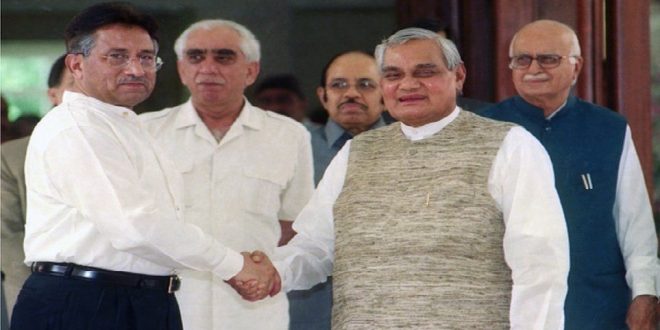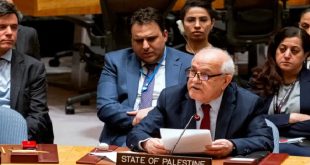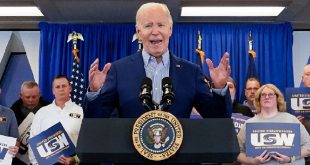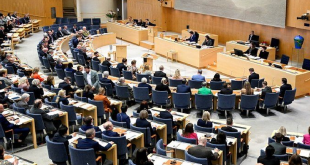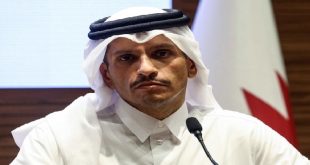06-02-2023
By SJA Jafri + Bureau Report
ISLAMABAD/ NEW DELHI/ DUBAI: In 2001, Pervez Musharraf believed the time had come to “turn over a new leaf” in rebuilding the broken relationship between India and Pakistan.
The nuclear-armed rivals had fought two wars and a limited conflict over the disputed region of Kashmir. Peace was elusive along the de-facto border dividing Kashmir between the two neighbors.
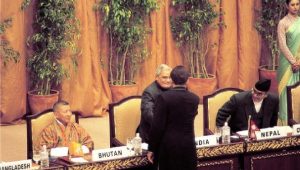 Yet it was not an opportune time for Musharraf to seek peace with his neighbour.
Yet it was not an opportune time for Musharraf to seek peace with his neighbour.
India regarded him as the architect of the 1999 conflict in Kargil, and suspected that that the general and his army had a hand in the hijacking of an Indian Airlines plane the same year. The 1999 October coup in which Musharraf ousted Nawaz Sharif, the then-prime minister, also made the Indians wary.
Musharraf recounted in his memoir that he found the “opportunity of a thaw” after the massive earthquake in India’s Gujarat in early 2001. The Delhi-born general telephoned then Indian prime minister Atal Behari Vajpayee to offer condolences and sent relief, including medicines. “That broke the ice and led to an invitation for meeting to visit India,” he claimed.
In his memoirs, former Pakistani foreign minister Khurshid Mahmud Kasuri has a slightly different version of events. He said that in a “change of heart”, Vajpayee’s deputy LK Advani broached the idea of inviting Musharraf and believed that it would be welcomed as an “act of statesmanship” by the Indian prime minister.
The two-day July 2002 summit between Vajpayee and Musharraf in the northern city of Agra was marked by high drama. Prolonged meetings between the two leaders and their foreign ministers led to two failed attempts at hammering out a joint agreement. This left Musharraf angry and exasperated and he left Agra in a huff.
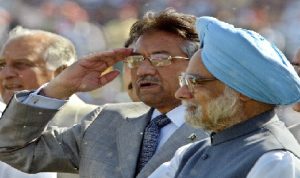 Musharraf recounted that he went to call on Vajpayee before leaving in the night.
Musharraf recounted that he went to call on Vajpayee before leaving in the night.
“I told him bluntly there seemed to be someone above the two of us who had the power to overrule us. I also said today both of us had been humiliated.”
“He just sat there, speechless. I left abruptly, after thanking him in a brisk manner”.
Musharraf believed that Vajpayee had “failed to grasp the moment and lost his moment in history”.
India had a more staid version of events, blaming the summit’s failure on the Pakistan leader’s grandstanding.
Vajpayee’s foreign minister Jaswant Singh was to recall that Musharraf had muddied the waters by holding an informal breakfast meeting with Indian journalists on the morning of his crucial meeting with Vajpayee. Some participants had recorded the off-the-record interaction, and the videos made their way to Indian news networks. “A private meeting was turned into a public spectacle,” one editor who attended the meeting said.
“The grandstanding fever had induced Musharraf into a great deal of unrestrained comment” at the meeting, Singh wrote in his memoirs. He said that the Pakistani leader did not seem to understand the “debilitating impact Kargil had on the atmospherics” and the fact that Vajpayee was offering a “new beginning”.
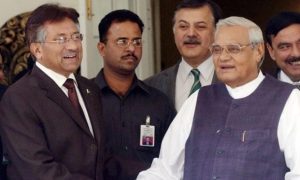 Singh wrote that at the meeting Musharraf expounded on how he wanted to solve the Kashmir problem and said there was “no terrorism from Pakistan”. He said the Pakistan leader seemed to be in a hurry to reach an agreement “anyhow”.
Singh wrote that at the meeting Musharraf expounded on how he wanted to solve the Kashmir problem and said there was “no terrorism from Pakistan”. He said the Pakistan leader seemed to be in a hurry to reach an agreement “anyhow”.
In Singh’s telling, when the draft agreement was shown to Vajpayee and select members of his cabinet, their collective view was that it lacked “sufficient and clear enough emphasis on terrorism, and [the acceptance that] it must cease, how could there be any significant movement on issues that are of concern or a priority only to Pakistan?”
The Indians also had a different version of Musharraf’s departure meeting with Vajpayee. Singh recounted that the prime minister told him later: “The visiting general sahib kept talking and I kept listening”.
Singh said the big takeaway from Agra was that grandstanding was not the best way to launch a summit between the two rivals. “Such diplomatic meetings do not easily lend themselves to the style and fashion of military manoeuvres,” he wrote.
But later the same year, Musharraf wrote that he surprised Vajpayee at a regional summit in Nepal when he moved to the front of the table and offered his hand to Vajpayee “who was left with no choice but to stand and accept it”.
He believed the “handshake had the desired effect”: Vajpayee visited Pakistan for a summit meeting in January 2004, and the two sides decided to move the peace process forward. Vajpayee’s party, however, lost the summer elections that year.
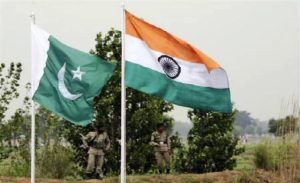 In September, Musharraf met the new Prime Minister Manmohan Singh in New York on the sidelines of a UN summit. In 2005, he came to India to watch a cricket match between the two countries, and the leaders agreed to carry forward the peace process and find a solution “out of the box”.
In September, Musharraf met the new Prime Minister Manmohan Singh in New York on the sidelines of a UN summit. In 2005, he came to India to watch a cricket match between the two countries, and the leaders agreed to carry forward the peace process and find a solution “out of the box”.
Many experts considered Musharraf’s 2006 four-point plan on Kashmir to break the deadlock with India pragmatic. The stillborn plan which included Pakistan giving up its claim to Indian-administered Kashmir if people from both regions had freedom of movement was possibly the best shot at peace between the two neighbors.
However, India was always divided about Musharraf. Jaswant Singh wrote about dealing with Musharraf’s “many incarnations”. Was he a man of peace? Or was he a crafty populist, who took an appeasing attitude towards India even as he burnished his anti-India credentials by supporting Kashmir’s movement for “self-determination”?
“One can talk about Musharraf’s unrelenting hostility towards India, as evidenced by his policies that trained militants and diverted aid from the US, all in an effort to target India but let’s not forget that he also arguably came closer than any Pakistani leader to make peace with India,” says Michael Kugelman, deputy director of the Asia Program at the Wilson Center, a Washington-based think tank.
The counterfactuals are tempting, Kugelman says. If there had been no terror attacks on Mumbai in 2008 and no pro-democracy movement that ousted Musharraf from power in 2007, he could have well co-authored a peace deal with India.
“In that case, we’d be having very different conversations about Musharraf’s legacy than we do today.”
 Pressmediaofindia
Pressmediaofindia
